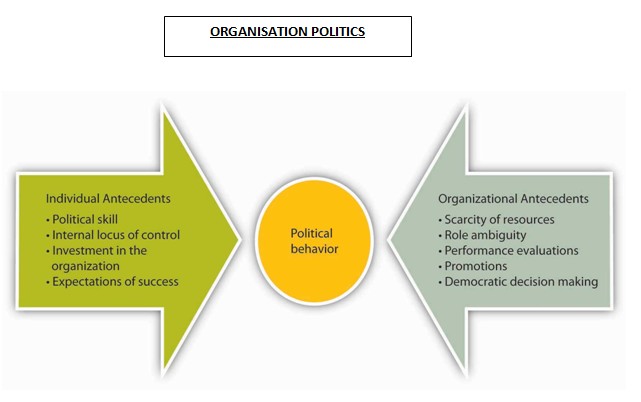Individual Antecedents
There are a number of potential individual antecedents of political behavior. These are
- Political skill: refers to peoples’ interpersonal style, including their ability to relate well to others, self-monitor, change their reactions depending upon the situation they are in, and inspire confidence and trust. Researchers have found that individuals who are high on political skill are more effective at their jobs or at least in influencing their supervisors’ performance ratings of them.
- Internal locus of control: Individuals who are high in internal locus of control believe that they can make a difference in organizational outcomes. They do not leave things to destiny .Hence, we would expect those high in internal locus of control to take on in more political Behavior. Research shows that these individuals perceive politics around them to a greater degree.
- Investment in the organization: is also related to political Behavior. If a person is highly invested in an organization either financially or emotionally, they will be more likely to be involved in political Behavior because they care deeply about the fate of the organization.
- Expectations of success: When a person expects that they will be successful in changing an outcome, they are more likely to take part in political Behavior. Think about it: If you know there is no chance that you can influence an outcome, why would you spend your valuable time and resources working to effect change? You wouldn’t. As time goes by you’d learn to live with the outcomes rather than trying to change them.
Organizational Antecedents
There are a number of potential Organizational antecedents of political behavior. These are
- Scarcity of resources: This breeds politics. When resources such as monetary incentives or promotions are limited, people see the organization as more political.
- Role ambiguity: Any type of ambiguity can relate to greater organizational politics. For example, role ambiguity allows individuals to bargain and redefine their roles. This freedom can become a political process. Research shows that when people do not feel clear about their job responsibilities, they perceive the organization as more political.
- Performance evaluations and promotions: Ambiguity also exists around performance evaluations and promotions. These human resource practices can lead to greater political Behavior, such as impression management, throughout the organization.
- Democratic decision making: Decision making directs to more political Behavior. Since many people have a say in the process of making decisions, there are more people available to be influenced.


